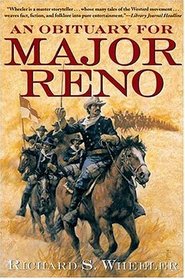Just in case you haven't figured it out, this is a novel. Or perhaps it is better to call it a novelization based on historic facts. All the facts are there---including the blemishes of men's character---but the author inserted a reporter who didn't exist, who seeks to uncover the truth about Marcus Reno.
Like most of us, Reno was a complicated person. Unfortunately, he survived a battle in which many Americans wished to make a hero of the primary commander. Most don't know George Custer was very much disliked by many in the military, especially, the men under his command. Even today, enlisted personnel have nick-names for their commanders. Their nickname for Custer was "Hard Ass," as they didn't like the way he treated them. The Indians called him "Squaw Killer," as that describes much of what he did. His reputation in the Indian Wars was not the best. You need to remember the "Yellow Press" was very much a part of American media back than, and it decided to make Custer a hero.
If you've ever seen "They Died With Their Boots On," a 1941 movie Hollywood made about Custer and the Little Bighorn, you probably agree it is a good action movie. But historically it is crap.
Also, as the author sometimes points out, and you read between the lines, politicians back then were very anxious people didn't investigate how Congress treated the U.S. Army as a step-child and provided poor funding for it. For example, when so-called "savages" have better firearms than the U.S. Army, you have to wonder who the Army's real enemy is.
Like most of us, Reno was a complicated person. Unfortunately, he survived a battle in which many Americans wished to make a hero of the primary commander. Most don't know George Custer was very much disliked by many in the military, especially, the men under his command. Even today, enlisted personnel have nick-names for their commanders. Their nickname for Custer was "Hard Ass," as they didn't like the way he treated them. The Indians called him "Squaw Killer," as that describes much of what he did. His reputation in the Indian Wars was not the best. You need to remember the "Yellow Press" was very much a part of American media back than, and it decided to make Custer a hero.
If you've ever seen "They Died With Their Boots On," a 1941 movie Hollywood made about Custer and the Little Bighorn, you probably agree it is a good action movie. But historically it is crap.
Also, as the author sometimes points out, and you read between the lines, politicians back then were very anxious people didn't investigate how Congress treated the U.S. Army as a step-child and provided poor funding for it. For example, when so-called "savages" have better firearms than the U.S. Army, you have to wonder who the Army's real enemy is.




